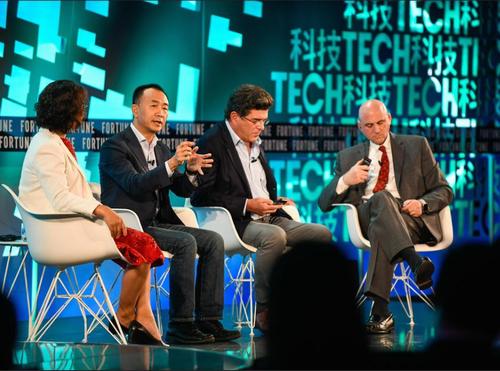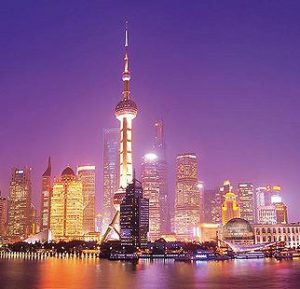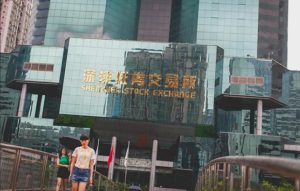Investors Embrace China

China hosts the Fortune Global Tech Forum 2019 on November 7, 2019 in Guangzhou. This panel is discussing how artificial intelligence, robotics, and cognitive computing are disrupting today’s healthcare industry. (Photo by Shawn Koh/Fortune) Creative Commons license via Flickr
By Sunny Lewis
LONDON, UK, November 11, 2019 (Maximpact.com News) – More than 80 percent of investors globally plan to increase their organizations’ allocation to investments in China over the next 12 months, finds a new survey undertaken by a specialized team within the 175-year-old London-based “Economist” magazine.
The Economist Intelligence Unit, a British business within the Economist Group providing forecasting and advisory services through research and analysis, conducted a survey of global investors’ China exposure, commissioned by Invesco, an independent investment management firm based in Atlanta, Georgia.
The China Position, a survey of 411 asset owners and professional investors across North America, Asia Pacific and Europe, Middle East and Africa, collected responses from executives at global organizations on exposure to Chinese investments.
More than 80 percent of investors surveyed said they intend to invest more in China in 2020, while only four percent of survey respondents said they plan to reduce

Shanghai Skyline, October 29, 2019 (Photo by Riviera Travel) Creative Commons license via Flickr
their Chinese investments.
Respondents included asset and wealth managers, as well as assets owners such as insurance companies, sovereign wealth funds and commercial banks.
Assets under management at surveyed organizations ranged from US$500 million to greater than US$10 billion. Respondents generally described their organization’s China exposure as above average when compared to industry peers.
Invesco President and CEO Marty Flanagan said, “The findings are promising and support our view that China’s massive growth and continuing efforts to allow greater access to its markets represent a significant and increasingly attractive opportunity for both domestic and global investors.”
“Having helped investors navigate markets in China for more than 30 years, we share the view that a thoughtful allocation of Chinese asset classes can play a meaningful role in helping investors achieve their long-term investment objectives,” Flanagan said.
According to the survey results, nearly 90 percent of respondents have “dedicated investment exposure” to China, where “dedicated” referred to those investments that are deliberately China-specific and not part of a broader regional or other grouping such as emerging markets.
This could include specific allocation to equities, fixed income or alternative assets through managed funds, Exchange Traded Funds or other investment vehicles.
What Drives the New Interest in China?

The Shenzhen Stock Exchange based in the city of Shenzhen, is one of two stock exchanges operating independently in country, the other being the larger Shanghai Stock Exchange. With a market capitalization of its listed companies around US$2.285 trillion in 2015, it is the eighth largest stock exchange in the world. August 30, 2015 (Photo by Blake Thornberry) Creative Commons license via Flickr
The top driver among survey respondents for dedicated investment exposure to China was given as “improvements to my organization’s China expertise.” Forty-one percent of respondents reported that as the reason for their investment decision.
Advancements such as improved corporate reporting, legal protections, regulatory oversight and financial intermediaries are also factors that caused survey respondents to consider increasing their investment in China.
For those organizations without a dedicated allocation, the top challenge regarding investing in China was given as, “lack of transparency in the financial system for foreign investors” at 39.5 percent.
Three additional challenges were cited by over 30 percent of respondents: concerns about legal protections, concerns about economic stability, and lack of trusted financial intermediaries.
When asked what catalysts might make their organization consider dedicated exposure, over 50 percent of respondents cited increased legal protections for foreign investors.
Andrew Lo, senior managing director and head of Asia Pacific at Invesco, said, “The results of this comprehensive survey support much of the broader sentiment we are seeing from our global clients. Many have begun to recognize China as a key investment destination and a pillar of global portfolio allocation.”
“Chinese authorities have shown their commitment to support investor interest in the country’s capital markets, and we have already seen constructive steps such as the lifting of investment quotas in the QFII program earlier this year.”
Qualified Foreign Institutional Investor (QFII) is a program that allows specified licensed international investors to participate in mainland China’s stock exchanges.
Survey respondents with current investments in China said they wanted to maintain this allocation for several reasons. The top response was portfolio diversification at 87 percent, followed by “gaining experience for internal teams” at 69 percent.
When asked whether these objectives had been met, 77 percent agreed that they had, while 21 percent said it was too early to tell and one percent said that objectives had not been met.
Survey respondents remain positive about the outlook for the global economy, and even more positive on China. About two-thirds of respondents believe global economic conditions over the next 12 months will be better than current conditions, while nearly three-quarters believe economic conditions in China will be better.
In line with what Invesco calls “China’s rising position as a global leader in technological development,” technology innovation such as artificial intelligence and robotics is the theme most likely to attract investment from 58 percent of the organizations surveyed, followed closely by financial services at 51 percent and “New Economy” services such as healthcare, IT and education in third place at 41 percent.
The renewable energy segment is another theme likely to attract investment, particularly in North America.
Jason Wincuinas, senior editor at the Economist Intelligence Unit, said, “The bullish stance uncovered in this survey was illuminating. Despite the ups and downs of global stock exchanges, the 12-month outlook from some of the world’s largest investors was distinctly positive.”
“We also learned that these organizations are leveraging China’s burgeoning financial-market reforms, with the overwhelming majority claiming to have some form of onshore business operations,” said Wincuinas.
He explained that the survey was taken before some of the most recent announcements about easing restrictions on foreign investors, which indicates China was already “much more integrated into the global economy than might have been expected.”
‘Decoupling’ Shifts the Balance
When asked what impact the current US-China trade war will have on their investment decisions, answers from survey respondents were mixed.
While 43 percent of respondents said it will have a negative impact on their investment decisions, 42 percent say it will have a positive impact.
North American respondents are the most optimistic, APAC investors are the most negative.
In both APAC and EMEA, over 67 percent of respondents expect to increase their China investments, and in North America 71 percent expect to increase their investments in China during the next 12 months.
Lo concluded, “We are encouraged that investors in this survey are allocating to Chinese investments not only for portfolio diversification and performance but also as a means of enhancing their own organization’s China expertise.”
“This is creating an institutional base of knowledge among global investors that provides familiarity and confidence to invest in Chinese markets, and this is set to accelerate as barriers to entry fall and the market continues to liberalize,” said Lo. “Moreover, any progress between the U.S. and China in resolving their current trade dispute should further improve sentiment.”
The U.S. and China may be headed for a deal to prevent further trade war escalation, but a hardening between the world’s two biggest economies could last far beyond the Trump presidency.
Kevin Rudd, the former Australian prime minister and current president of the Asia Society Policy Institute, fears that talk of “decoupling,” the two economies could become a “self-fulfilling prophecy,” with drastic results.
In a speech delivered at the University of California San Diego November 4, Rudd said that there are already some signs of decoupling, even if a complete severing of economic ties is unlikely.
China has made eliminating its reliance on U.S. technology a top national priority, for instance. The United States is attempting to block Huawei’s global 5G rollout and each country is racing to defeat the other in artificial intelligence.
Rudd said, “A fully decoupled world would be a deeply destabilizing place, undermining the global economic growth assumptions of the last 40 years, heralding the return of an iron curtain between East and West and the beginning of a new conventional and nuclear arms race with all its attendant strategic instability and risk.”